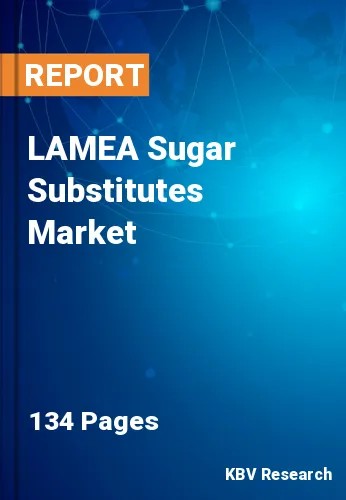The Sugar Substitutes Market is Predict to reach USD 25.9 Billion by 2030, at a CAGR of 5.8%
Special Offering :
Industry Insights | Market Trends | Highest number of Tables | 24/7 Analyst Support
Sugar Substitutes Market Growth, Trends and Report Highlights
According to a new report, published by KBV research, The Global Sugar Substitutes Market size is expected to reach $25.9 billion by 2030, rising at a market growth of 5.8% CAGR during the forecast period. In the year 2022, the market attained a volume of 1,126.0 Kilo Tonnes, experiencing a growth of 6.3% (2019-2022).
The Beverages segment is leading the Global Sugar Substitutes Market, by Application in 2022; thereby, achieving a market value of $11.7 billion by 2030. The beverages segment includes carbonated drinks, flavored water, sports drinks, and teas. Sugar substitutes allow manufacturers to create diverse beverage options catering to different tastes and preferences. The industry has seen continuous innovation in the formulation of beverages using sugar substitutes. These aspects will lead to increased growth in the segment.
The High-intensity Sweeteners segment is registering a CAGR of 5.5 % during (2023 - 2030). High intensity sweeteners enable the creation of sugar-free and reduced-sugar versions of a wide range of products, including beverages, dairy, confectionery, and baked goods. Ongoing advancements in food science and sweetener technology have led to new and improved high intensity sweeteners with better taste profiles and stability. These factors will pose lucrative growth prospects for the segment.
Full Report: https://www.kbvresearch.com/sugar-substitutes-market/
The North America region dominated the Global Sugar Substitutes Market, by Region in 2022, and would continue to be a dominant market till 2030; thereby, achieving a market value of $8.5 billion by 2030. The Europe region is anticipating a CAGR of 5.6% during (2023 - 2030). Additionally, The Asia Pacific region would exhibit a CAGR of 6.5% during (2023 - 2030).
List of Key Companies Profiled
- Tate & Lyle Plc.
- Cargill, Incorporated
- Archer Daniels Midland Company
- Ingredion Incorporated
- Roquette Freres SA
- Ajinomoto Co., Inc.
- DuPont de Nemours, Inc.
- Pyure Brands, LLC
- Foodchem International Corporation
- Matsutani Chemical Industry Co., Ltd.
Sugar Substitutes Market Report Segmentation
By Application (Volume, Kilo Tonnes, USD Billion, 2019-2030)
- Beverages
- Food
- Bakery & Confectioneries
- Dairy
- Others
- Health & Personal Care
By Type (Volume, Kilo Tonnes, USD Billion, 2019-2030)
- High-intensity Sweeteners
- High Fructose Syrup
- Low-intensity Sweeteners
By Geography (Volume, Kilo Tonnes, USD Billion, 2019-2030)
- North America
- US
- Canada
- Mexico
- Rest of North America
- Europe
- Germany
- UK
- France
- Russia
- Spain
- Italy
- Rest of Europe
- Asia Pacific
- China
- Japan
- India
- South Korea
- Singapore
- Malaysia
- Rest of Asia Pacific
- LAMEA
- Brazil
- Argentina
- UAE
- Saudi Arabia
- South Africa
- Nigeria
- Rest of LAMEA
Related Reports:



